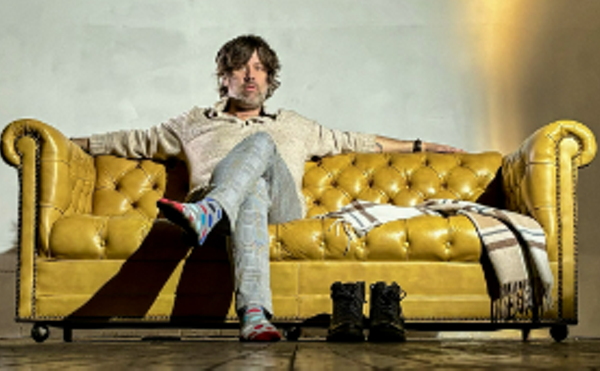Spirit
(Atlantic)
Jewel is the cool big sister. Pretty, worldly, focused, talent to spare. Young women want to be her; young men know they'll never have her. She could be anything. She chooses, you almost sense, to write and sing songs. Too bad Ms. Kilcher didn't bring this level of sophistication to Spirit, a world where mean people suck, Mother Earth is loved, and everyone leads uncommon lives. Nice ideals, weak record.
"If I could tell the world just one thing/It would be that we're all OK," she sings on "Hands." The album's full of these fluffy bromides. Her mushy tinklings--"Kiss the flame, Fill your lives with love and bravery, Be careful with each other"--are the province of bumper-sticker writers, not poets. Not that she can't write. She can, and that's what's frustrating. "The man is a marvel," goes "Do You," "but it's a shame about his brains/But that's OK/You say, 'He's got straight teeth and it's good sex.'" The sentiment may be hollow, but at least it's real.
Musically, the fullest arrangements are the best. Jewel's songs aren't complicated enough for girl-and-her-guitar production. "Barcelona" has the most potential, with piano and Stonesy pedal steel guitar shadowing slow strumming. But by the chorus ("Let me fly," predictably), Jewel is soaring with the divas.
--David Martin
U2
The Best of 1980-1990
(Island)
To longtime fans, U2's first greatest hits set may appear to be an exercise in redundancy. Cripes, you're thinking, every U2 fan in the world already owns all of the full-length versions of these songs on their original albums.
True enough. So U2 has dangled a carrot in front of those who move quickly enough to buy this new collection--a "limited edition" (1.5 million, I'd imagine) bonus disc, simply titled B-Sides. It's an often fascinating set of rarities only available to this point on import CD singles and 45s.
While B-Sides makes for an attractive incentive to buy, there may still be a few ultra-dedicated followers who are perfectly happy owning "Walk to the Water," "Silver and Gold," and "Unchained Melody" on imports or bootleg compilations (not that there's anything wrong with that). To address this hardcore demographic, U2 has helpfully included a brand spankin' new version of the Joshua Tree-era B-side "The Sweetest Thing" to force the issue.
Hmmm, the diehards must be thinking, all those reports of fruitful studio activity with Brian Eno and Daniel Lanois, and all we get is a remake of a song that was B-side fodder eleven years ago. Seems a little slapdash, doesn't it?
Well, yes it does, especially considering that the new version of "The Sweetest Thing" is curiously lifeless in comparison to the original "unfinished" take. It could have been a lot worse; the studio rendition of "Trash, Trampoline, and the Party Girl" that closes disc two is so godawful that not even a Fatboy Slim remix could save it.
Okay, I'm through slapping around "The Sweetest Thing." One necessary evil is far outweighed by the utter joys sequenced around it.
It's no secret that Island coughed up an awful lot of cash to release this album, but based on the results, it was worth it--The Best of 1980-1990 is the exhilarating sound of an earnest, ambitious, and unbelievably charismatic band taking the world by the throat.
It's easy to forget in this cynical, post-Achtung Baby world that U2 was one of the few bands in rock history that wasn't afraid to wear its heart on its sleeve and lead audiences on a near-religious journey. It was almost frightening how easily U2 could accelerate pulse rates and stand neck hairs on end, climbing to moving peaks of raw lyrical and sonic power on songs like "With or Without You," "I Will Follow," "Pride," "Where the Streets Have No Name," "All I Want Is You," "I Still Haven't Found What I'm Looking For," and "Sunday, Bloody Sunday." These songs retain their immense presence and breathtaking effect today.
It's unfair to say that the '80s was when U2 "really mattered," since the '90s incarnation of U2 is for all intents and purposes a different band from what is represented here, and Achtung Baby, Zooropa, and Pop were hardly disposable records. Yet, listening to U2's recent work in comparison with The Best of 1980-1990, it's impossible to escape the feeling that something grand has indeed been lost.
--Victor Cooke
The Saw Doctors
Songs From Sun Street
(Paradigm)
Same Oul' Town took a lot of Saw Doctors fans by surprise. The regular guys who made a living singing about subjects no deeper than football, girls, parties, farm work, and pints of porter suddenly hit their listeners with a disc full of wistfulness and dreaminess; many of the songs sounded like the rumination of a middle-aged man pining for his lost youth.
Enough of that. Let's rock!
On Songs From Sun Street, the ratio of sentimentality to that good old rock and roll has been practically reversed from what it was on 1996's Same Oul' Town. The key word here is fun.
There are a few serious songs on Sun Street--there always are on a Saw Doctors album--but, like the band's previous work until Same Oul' Town, they're clearly the exception.
The tone of Sun Street is set on the opening song, "Good News," with its yeah, yeah, yeah chorus reminiscent of the '60s British Invasion that has so influenced the Docs. That's followed by "Sugartown," a song about their hometown of Tuam that could have been written by Bruce Springsteen about New Jersey. Next comes a bit of nostalgia with the corny "Galway and Mayo" and the moribund "Carry Me Away."
After that it's full-steam rock and roll. "Catriona Tells Lies," which has been released as a single, is in the same vein of many of the Saw Doctors' biggest hits. It and the playfully risque "D'ya Wanna Play My Guitar?" have a garage band sensibility that sits right alongside classics such as "96 Tears" and "Double Shot of My Baby's Love."
Rock and Irish folk blend wonderfully in the anthemic "Joyce Country Ceili Band" and "Tommy K," a fitting tribute to a pioneering Irish disc jockey. "Will It Ever Stop Raining" recalls the work of bands like Madness and the Specials.
The only real dud is "Away With the Fairies," a tune based on a Celtic term for a person whose mind is wandering. If it appeared on a children's record, fine. On this one, it's merely wimpy.
--Steve Byrne
Peter Wolf
Fool's Parade
(Mercury)
Fool's Parade is Peter Wolf's fifth solo album since he left the J. Geils Band. In many ways, it's the best of the bunch. If you listened to his passionate Long Line from two years back, you know how strong a statement that is.
The formerly boisterous blues-rocker has matured a lot over the years. Yapping and snapping have given way to a more soulful, thoughtful, and heartfelt delivery. Where his earliest offerings were decidedly more libido-led, his new material talks love, loss, and reminiscence. His voice is still distinctively glorious. No one mauls vowels into new sounds like Wolf. You get this guy wound up, and he's got his own dialect. He stays true to form on the more ballad-like Fool's Paradise, on the looking-for-one-more-chance "Waiting on the Moon," and the sax- and organ-driven "All Torn Up." He also shows he's still got his rap (and he was rapping before rap was rap) in his horn-filled reworking of the O.V. Wright-written "I'd Rather Be Blind, Crippled and Crazy."
The first single from this eleven-song collection, "Turnin' Pages," is a pleasant enough pop piece with a reggae-flecked guitar line. It's more J. Geils than Peter Wolf, and sadly, that may be why it was chosen as a single. He may have been better off offering "All Torn Up," the up-tempo "The Cold Heart of the Stone," or even "Pleasing to Me," a Marvin Gaye-styled duet that he shares with Ada Dyer. These tracks are more of what the disc is about, and truthfully, more radio worthy.
--Lee Barrish
House of Wires
You Are Obsolete
(Tooth and Nail)
As if attempting to disprove the album title's accusations, House of Wires sounds like electronica circa 1983. The first cut, "Busy," plays as if nothing has progressed in the realm of drum machines and Casios over the last decade-and-a-half. Even the cover art of the 45-minute effort, with its Tron-like graphics, smacks of the early '80s. None of which is to say You Are Obsolete is a horrible record.
House of Wires, upon closer inspection of tracks like "Everything Lies in Ruins" and "Death Is a Beginning," is more like a reinvention of the sound that got us hooked on synthetic instruments in the first place. No doubt inspired by New Order and the Cure, they appear very much to be an '80s tribute band that writes original songs.
By the last tracks, like "When Words Fail" and "Final Moment," the nostalgia begins to wear thin. It's almost as if the band itself tires of the sound, a feeling that is not helped by vocalist John Sonnenberg, who sounds as though he's singing through a constant yawn. When he does finally attain some alternate inflections on "Final Moment," the sound comes off like the Casio-generated trumpet that he is obviously trying to imitate.
You Are Obsolete might please thirtysomethings, making them feel like kids again, but even they may see through the disguise and realize that House of Wires is a nifty novelty. After all, you can always turn to the droves of "Hits of the '80s" collections if you want to recapture your youth.
--David Powers
Billy Squier
Happy Blues
(J-Bird)
Think twice before you write Billy Squier off as another one of those has-been '80s rock stars. Admit it--you still sing along with "In the Dark," "My Kinda Lover," and "Rock Me Tonite."
Squier would be the first to admit that his days of Alpha-male swagger rock are behind him. Disenchanted with the music biz, he turned his attention elsewhere after releasing 1993's Tell the Truth and wound up a finalist in a Sundance screenwriting competition. He's also a full-time dad now, a lifestyle which brought Squier back to his roots--noodling at home on an acoustic guitar.
The time was right for Happy Blues, a set of eleven poseur-free acoustic gems that showcase his mature side. It's an introspective, ear-catching, foot-tapping album, on which Squier makes clear he's playing by nobody's rules but his own. "I don't want to be happy if happy means I got to be like you," Squier rasps on the title track, establishing a theme of sorts. Billy goes unplugged and lets his fingers work out an uncomplicated, unhurried-but-groovin' twelve-bar pattern. This guy's still got chops.
Squier covers Joni Mitchell's classic "River," making good on the folk standard, changing only the lyrics to reflect a man-to-woman point of view. Two songs from Squier's 1997 VH1 performance make justified appearances on Happy Blues: "Stroke Me Blues" is precisely what you'd expect--an acoustic reworking of Squier's early smash. The real charm of "Stroke Me Blues" (like Clapton's unplugged "Layla") is that it shows how firmly our most beloved rock hits are based on the blues. "Inferno (Everybody Cries Sometimes)," also from the VH1 session, finds Squier singing a girlish falsetto--but his voice doesn't crack. Tell me about your hard times, he squeals of the trials and tribulations of superstardom. I already been through that.
Happy Blues closes with the home demo "Two," a birthday greeting to Squier's "little man," Harrison. Like many rock dedications, this one is told from the "I'm-sorry-my-latest-tour-prevents-me-from-spending-more-time-with-you" perspective. This one succeeds because it doesn't pretend to be anything more than what it is--a Dad singing to his kid and playing guitar.
Perhaps that's why Happy Blues is so persuasive. Squier deserves credit for doing the unplugged thing the right way. It's just a guy with his guitar, and a bunch of decent songs.
--Pete Roche











